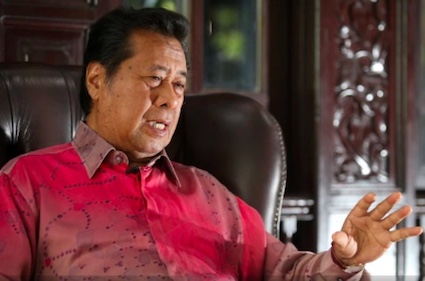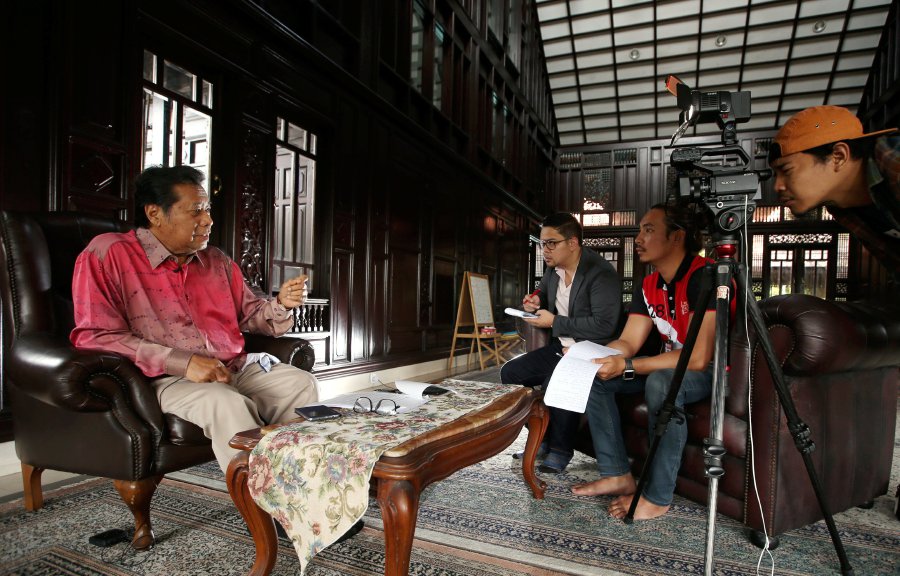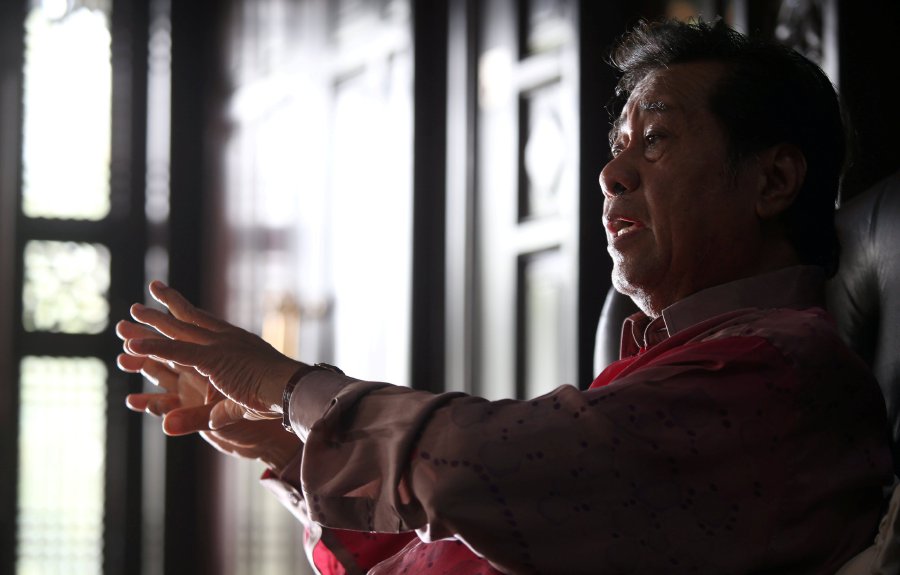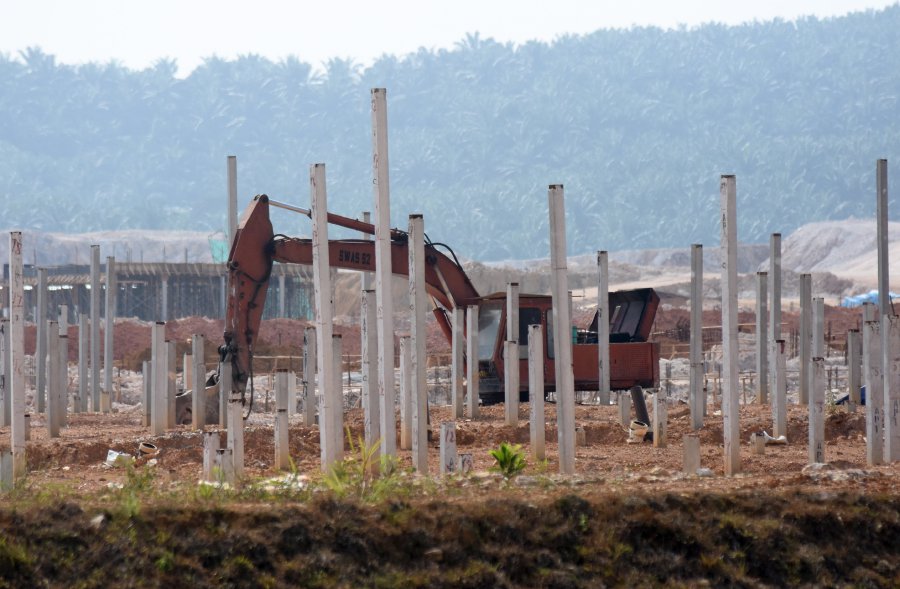Q&A: Khalid Ibrahim tackles controversial Ijok land deal

Former Selangor Menteri Besar Tan Sri Khalid Ibrahim created a stir recently when he criticised the Selangor government’s controversial decision to withdraw its court case concerning plots of land in Ijok against two developers. In an exclusive interview, he lays bare his views on the matter to NSTP reporters.
Q: Can you tell us more about the controversial piece of land in Ijok?
A: Ijok was part of a Green Revolution Plan which involved 1,141ha, dating back to 1973. The state government had a forest reserve which was then used in the scheme to provide opportunities to the people to own land.

Former Selangor Menteri Besar Tan Sri Khalid Ibrahim speaks to NSTP reporters — Syed Umar Ariff (right), Luqman Arif Abdul Karim (2nd from left) and videographer Shahir Othman. Pic by MOHD YUSNI ARIFFIN.
The reserve was then approved to become an agricultural zone. Each recipient was allocated with 1.2ha of land. In order to assist the would-be farmers, the Selangor Agricultural Development Corporation was requested to manage the huge tract of land in a similar vein to Felda.
(However) some ‘smart entrepreneurs’ bought the land from these settlers, who were promised compensation, money and houses as their land would be used for housing projects, not agriculture. So, the settlers handed over their rights to the land to these people.
Q: When it comes to managing the people’s assets, how would you have resolved land issues such as the Ijok case?
A: When I looked into the problem concerning the land in Ijok as the menteri besar, I found that there were many abandoned projects in Selangor. The previous state government had given the land to developers, developers say they want to develop the land, and what happened next?
The developers took loans from banks, launched the projects, people bought them and took loans from banks. During the process, many developers, believing that they had yet to make a profit, closed down the projects. When that happened, the state recorded a loss over the land.
Secondly, buyers who had taken out loans would now have to repay the banks despite the houses not being completed. When we went looking for the developers, we found out that they had changed companies. And were we to redevelop the land, we would need investments. But the land could not be used (for redevelopment) because it has been mortgaged to the banks. The banks would not allow it as well.
Such problems occurred not only in Ijok but other places as well. When I became MB, I knew of 20 such projects.
I took the project in Ijok as a (test) case; on how would I resolve the issue, revive the project, and help landowners and house buyers.
I had no wish to aid developers that had run away. Had we solved this, the state would have had proper procedures, minimising risks of abandoned projects.
Q: Why did you choose to seize the land?
A: Even if I had told the developers to rework the land, they would say that they did not have the money. They would cry bankruptcy. Had I called other developers for the same purpose, they would not want to assume the debts of the past.
If the debts fall on the state government’s lap, what is the government’s stake (in the project then)? Nothing.
If the buyers are told to complete their own respective houses, the problem is that they are not allowed to enter the property at all as it had already been mortgaged to another party.
So, it was only fair for us to seize the land. When we hold power over the land, it means that we will have no encumbrances, but of course, we have to repay those who hold interests in the property.
I did make seizures, but they only involved small plots of lands, about 2ha. But we had no problems from the developers. The state government exercised its power through the National Land Code.
Q: So the state government at the time did pay compensation to all parties involved?
A: Yes, we did it according to legal procedures, at valuers’ value. Independent valuations were carried out.
We had to pay them, albeit with careful analysis because if the land was worked on by developers who did not even pay land premiums, we (state government) can pay for the land at agricultural property prices.
We paid more than RM160 million. The takeover of land was only implemented after the compensation was paid out. There were only two problems left; the state’s authority in seizing the land and whether the people were compensated fairly. Those were decided by the court. The amount paid involved all stakeholders including banks, companies, and settlers in 2009.
Q: Did the two developers ask for a bailout?
A: They did. I told them they would need to fork out RM40 million in capital to fund the revival of their projects. But these two developers had no money and did not dare request for a full bailout.
When all suggestions could not be executed, I told them to find a better way. This took place in 2009, during a meeting at a community hall in Kuala Selangor involving almost 700 settlers. I was there and brought along the state financial officer and land and mines director to explain the problems.
I made the demand in front of everyone, but the two developers could not fulfil it.
(Why the developers had no money) was because the land had been mortgaged and the money used for other unprofitable endeavours. The mortgage process had issues as well because the property’s value was not made based on its actual value. The property was mortgaged at a higher value. You can get between RM20,000 to RM40,000 per acre if you mortgage agricultural land. But if you mortgage it as development land, you’ll get RM400,000 (per acre).
Q: You viewed the Ijok land issue as a ‘test case’. What was the bigger plan you had in store based on the outcome?
A: This was not the first time I did it (seizing land). I had met the people of Ijok at least four times to explain the problems. I had also tried to get the developers to meet the people and have them revive the abandoned projects.
But I saw that they only prioritised profit. As such, it was better for the government to take over the land (and project) and if we make a profit, it can be returned to the people.

Former Selangor Menteri Besar Tan Sri Khalid Ibrahim told the two developers to for our RM40 million in capital fund to revive their projects. Pic by MOHD YUSNI ARIFFIN.
If thought that if I could solve the Ijok issue in such a manner, it can then be adopted by the Selangor Planning Unit and local governments, among others, for other similar cases.
Q: Do you believe that the current state government’s approach to resolving the Ijok issue has undone what you tried to accomplish?
A: Yes. Already, many are asking for the government to assist them. It is a pity for the house buyers. We need to use the right procedures in addressing abandoned projects so that developers would think twice.
The state needs to know the value of the land it wants to buy. (For example) a 1,133ha land. With such a size, its value according to the agricultural property market is also high. But the government must be bold in making the purchase, with the intention to develop and gain revenue from it. This is something the state government should not be afraid to do. It’s not like we are just giving money without getting something in return. If the price of the property is too high, then don’t buy it. It is possible that the current menteri besar (Datuk Seri Azmin Ali) has no experience in such matters, but I can show him that I have experience in undertaking a housing project.
When I was with Guthrie, I did a project in Bukit Jelutong which was between three and four times bigger (than Alam Perdana).
We need to be smart in making it work. We should not be afraid because we won in court. Otherwise, we do not have to frequent the courts. And if there was no profit to be made, why then the clamour over the property?
It is a problem when the state gives land to developers who are not good at their craft. They get the land, sell it and become a broker of sorts. There is only a modicum of responsibility on resolving issues on state development. That is why I do not want to facilitate bailouts. If the developer makes a loss, then it’s a loss. That is what happens when you are in business. The same goes for the state. Otherwise, how many times do we need to give aid? The ones whom we must help are the buyers. We need to fix things that are not right.
Q: So you believe the present Selangor government facilitated a bailout?
A: This is why we need to talk about what happened. The developers brought the case to the High Court. Other than the state government, an individual legal suit was also filed against me as the MB. The same thing happened when the case was brought the Court of Appeal and Federal Court. The state government did not invite me to defend myself during Federal Court proceedings.
The decision to withdraw the takeover was done without my agreement. But if I take legal action against the matter, where would it go? It is not a problem between me and the state government, but it concerns development in Ijok.
I raised the issue in 2016 on why the land was returned to the developers. In the original plan, we would revive the project, create gross development value (GDV) and solve issues pertaining to settlers and other related parties. Later, the land would be tendered off and bought after getting approval for its GDV and planning, not through non-transparent negotiations.
Q: Do you believe that you would have won in the Federal Court?
A: This is not about business, but the need for the government to stand by its right to take over property if there are discrepancies. It is a matter to be decided by the judge.
The Federal Court has the right to change its decision or stand. But the state government should not be afraid of the courts if it is confident it is not in the wrong.
If we win in the High Court and Court of Appeal, the same will (likely) take place in the Federal Court.

A general view of the land in Ijok. Pic by MOHD ASRI SAIFUDDIN MAMAT
The issue now is that the state government (then) had carried out its duties thoroughly and with responsibility. The people’s interest was prioritised. We supported developers who worked well with the state government. Otherwise, no.
I raised this issue at the state assembly. If it is not resolved properly, it will be a loss for the people. I have no vested interest concerning Azmin. My interest is in seeing the people benefit from a good administration.
The state government (now) always holds negotiations with developers. For me, that should be practised as the state government’s position is above the developers.
If we are responsible and transparent, we cannot hold negotiations. A just state government will only allow business opportunities through open tender. You cannot call them and say: “Eh come… you, I can give”. We cannot do that. If we do, then people will suspect us of holding side negotiations. Through an open tender, we can reduce abuse of power and corruption. (That is why) we brought the case to the Federal Court to ensure that there were no negotiations, corruption and abuse.
I believe that the state government must remain in a position (of integrity). I had never used the government for side negotiations because the people reminded me to mind over their properties with utmost responsibility.

